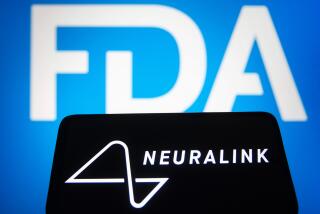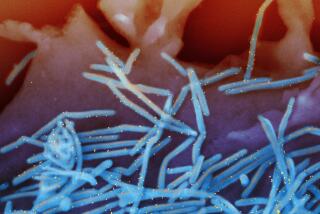AIDS Vaccine Is Reported OKd for Human Tests
- Share via
An experimental AIDS vaccine developed by a small, little-known Connecticut firm has become the first to receive government approval for testing in humans, a usually reliable trade publication reported Monday.
The Washington Drug Letter said the U.S. Food and Drug Administration has given its approval for a vaccine manufactured by MicroGeneSys of West Haven, Conn., to be tested in clinical trials that will be supervised by the National Institute of Allergy and Infectious Diseases.
Officials of both federal agencies refused on Monday to confirm the report. MicroGeneSys and the institute have scheduled a joint news conference in Washington today, at which time a formal announcement is expected.
That a test vaccine has been approved for testing is not surprising in and of itself. As recently as last spring, Dr. Anthony Fauci, institute director, had said that five or six candidate vaccines were under FDA consideration and that human trials could be expected to begin late this year or early next year.
The approval of the MicroGeneSys product apparently means only that such trials might begin several months sooner than anticipated.
Still, the approval would mark a milestone in the fight against acquired immune deficiency syndrome.
Approval would also be the first step in a long process that, it is hoped, would lead to a protective vaccine against the invariably fatal disease.
Typically, the first step in testing any vaccine--Phase One in the biomedical community--is to see whether such an agent has any serious side effects. If shown to be reasonably safe, the vaccine would undergo further tests for efficacy.
This would mean that even if safety testing were to begin immediately, it may well be several years before it is known whether the test vaccine actually protects against AIDS.
The possibility of an AIDS vaccine testing program in uninfected humans may also push scientists to quickly decide what categories of people would make ideal volunteers.
Among such candidates would be those considered at high risk of coming into contact with the virus, such as military personnel in parts of the world where the incidence of AIDS infection is high, prisoners, patients at clinics for treatment of sexually transmitted diseases, intravenous drug users, prostitutes and the sex partners of high-risk individuals, including gays and bisexuals.
MicroGeneSys’ vaccine reportedly is made of proteins from the outer coating of the AIDS virus. Company officials in Connecticut and the firm’s public relations agency in New York refused to divulge details about the vaccine or about the firm.
Scientists have been working feverishly to decide which of the proteins on the outer coating of the virus might cause the patient’s immune system to respond by producing antibodies capable of protecting against the AIDS virus. One of the chief problems has been that the protein overcoat has varied significantly around the world.
Earlier this year MicroGeneSys president Frank Volvovitz was quoted in an interview as saying, “Our approach is aimed at producing a synthetic replica of the entire coat protein.
2 Other Developers
“I think the point to remember is the entire coat doesn’t change. There are areas in the coat that remain constant,” he said.
Two other developers of experimental AIDS vaccines, with applications for human testing pending before the FDA, are Oncogen, a division of Bristol-Myers Co., and George Washington University in Washington.
MicroGeneSys appears to be obscure even among those who follow the fast-moving field of biotechnology. Sandra Woodruff, a consultant for Biomedical Business International, a Tustin company that analyzes the health-care industry, said she had never heard of the firm.
At the Third International AIDS Conference in Washington in June, Dr. John La Montagne of the National Institute of Allergy and Infectious Diseases said the institute has contracted with six universities to conduct the clinical trials required to demonstrate a vaccine’s safety and efficacy. They are Baylor University, Houston; the University of Rochester, Rochester, N.Y.; Johns Hopkins, Baltimore; the University of Maryland, Baltimore; Vanderbilt University, Nashville, and Marshall University, Huntington, W. Va.
Condoms may not provide sufficient protection against AIDS and other diseases, research shows. Part V, Page 1.
More to Read
Sign up for Essential California
The most important California stories and recommendations in your inbox every morning.
You may occasionally receive promotional content from the Los Angeles Times.













